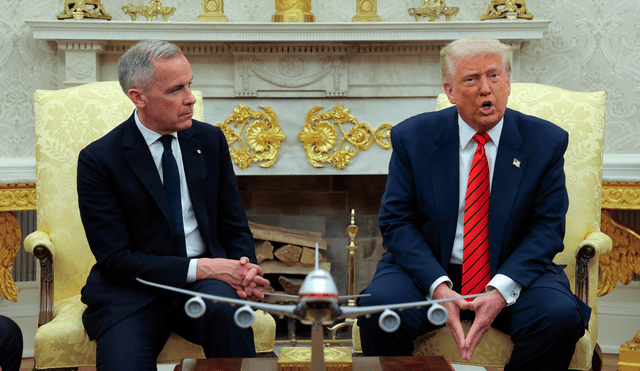Canadian PM Mark Carney meets Trump at the White House and says 'Canada is not for sale'
U.S. President Donald Trump and Canadian Prime Minister Mark Carney meet to discuss the strained trade relations between their countries, fueled by Trump’s tariffs and the controversial idea of Canada becoming the 51st U.S. state.

During a notable meeting of U.S. President Donald Trump and Canadian Prime Minister Mark Carney, the two leaders discussed the persistent tensions between their respective nations at the White House, primarily created by Trump's highly controversial tariffs.
Although there are tensions, they both seemed to sustain a cordial interaction to start discussing the pressing matters that have divided the two countries, including the U.S. trade deficit with Canada, and Trump's idea that Canada would become the 51st U.S. state, which Carney rebutted. The two leaders are starting what could be significant discussions about trade and collaboration in the future.
Mark Carney emphasize Trump that 'Canada is not for sale'
The meeting started amicably, with smiles and a handshake, despite Trump's previous remarks about making Canada a 51st state, which has strained their relations.
Trump emphasized that he and Carney would only talk about the acquisition of Canada if some other person mentioned it, but stressed that Canada would get a "tremendous" benefit in which the marriage of the two would make a "wonderful marriage." Even if Canada continually rejected the idea, Trump, who has considered acquiring Canada, described his thoughts.
Trump said, "As a real estate developer, I know how to see pretty things," calling the border an "artificially drawn line," and the idea of the possible formation of the countries, beautiful., he added.
Carney, no doubt aware of the tenor of Trump's comments, related it to a real estate metaphor stating that certain locations "are never for sale", using Buckingham Palace as an example, and reiterated that Canada is never for sale. He highlighted the significance of partnership and what both countries could do together, instead.
During the meeting at the White House, Canadian Prime Minister Mark Carney told President Trump that Canada is "not for sale", shortly after the Republican referred to the U.S.-Canada border as "artificial" and romantically.
"It's not for sale, won't be for sale ever," Carney said.
"Never say never," Trump humorously said several times.
Carney, a former central banker but not a politician, became Liberal leader in March, replacing Justin Trudeau, who had an uneasy friendship with Trump.
This meeting, which marked the first between the two since Carney took office, saw Carney express his intention to maintain a firm stance against Trump's policies, especially on trade and borders.
Canada is second-largest trading U.S. partner
Canada remains the second-largest trading partner of the U.S. with over $760 billion in goods exchanging hands between the two countries last year. In March, the U.S. Commerce Department highlighted the declining Canadian trade surplus with the U.S., as Trump expressed his tariffs on imported Steel and Aluminum.
Canadian exports into the U.S. fell considerably; however, Canadian companies did focus on exporting their products to new emerging markets, in order to compensate lost exports to the U.S. Trump's 25% tariffs imposed on steel and aluminum and the tariffs on non-compliance cars would have helped contribute to these changes. Furthermore, Trump announced his intention to impose a 100% tariff on all films created outside the United States, which could influence Canada's film sector.
Trump has introduced uncertainty into global markets with his tariff policies and said Carney would concentrate on the areas of friction, with a reference that the U.S. could operate without Canadian products. "Whatever happens, we're going to be on good terms with Canada," Trump said. Carney's Liberal Party came to power in the April 28 election with commitments to deal with Trump's policies.
Before Carney's visit, Trump published a social media post questioning why the U.S. subsidizes Canada with $200 billion a year, plus provides military protection for free. He also said the U.S. did not need Canadian py; cars, energy and lumber themselves, just their friendship.
Many saw Trump as referring to the energy deficit created by U.S. imports of Canadian oil; Canada had a merchandise trade surplus with the U.S. of $74.25 billion in 2024.












